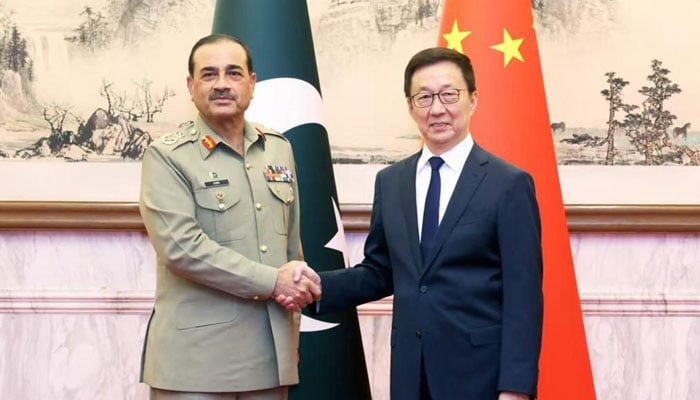Confident reset
Field Marshal Munir, FM Dar's visits to China, US form framework designed to reinforce Pakistan's strategic partnerships
August 05, 2025

As great-power competition intensifies and regional dynamics grow more complex, Pakistan is carving out a confident, independent role on the global stage.
Two recent high-level engagements, COAS Field Marshal Syed Asim Munir's official visit to China and Deputy Prime Minister Ishaq Dar's diplomatic outreach in Washington, DC, illustrate Pakistan's evolving foreign policy strategy.
It is a policy rooted in sovereignty, economic transformation, regional peace and consistent advocacy for the rights of the people of Indian Illegally Occupied Jammu and Kashmir (IIOJK). These visits are not isolated events. They form part of a coherent framework designed to reinforce Pakistan's strategic partnerships while preserving its diplomatic independence.
The recent visit of COAS Field Marshal Syed Asim Munir to the People’s Republic of China reaffirmed the strength of the Pakistan-China strategic partnership. According to ISPR, Field Marshal Munir held meetings with senior Chinese officials, including Vice President Han Zheng, Foreign Minister Wang Yi and top leadership of the Central Military Commission and the People’s Liberation Army (PLA).
He was received with a guard of honour at the PLA Army Headquarters, symbolic of deep-rooted military-to-military confidence. In detailed discussions, both sides expressed satisfaction over bilateral ties and exchanged views on: expanding defence and counterterrorism cooperation; joint responses to hybrid threats and transnational challenges; and enhanced protection and development of the China–Pakistan Economic Corridor (CPEC).
The Chinese leadership acknowledged Pakistan’s armed forces as a stabilising force in South Asia and reaffirmed support for Pakistan's sovereignty and territorial integrity. Notably, China's longstanding position on the peaceful resolution of the Kashmir dispute in accordance with UN Security Council resolutions was reaffirmed, underscoring the moral and legal legitimacy of Pakistan’s stance.
While Pakistan reinforced its strategic ties in the East, Deputy Prime Minister and Foreign Minister Senator Mohammad Ishaq Dar advanced diplomatic engagement with the US. His recent visit to DC included meetings with senior US officials and policy leaders, where the emphasis was on rebalancing the relationship through economic cooperation, investment and mutual strategic interests.
Dar presented a vision of Pakistan as a self-reliant, trade-oriented economy and highlighted sectors where bilateral engagement could be expanded: energy and critical minerals; technology and digital innovation; and climate resilience and infrastructure development.
Crucially, the Kashmir issue was addressed directly. In policy forums and official meetings, Dar reaffirmed Pakistan’s commitment to the rights of the Kashmiri people and emphasised the importance of resolving the dispute peacefully. He condemned recent developments in IIOJK that aim to project normalcy through electoral processes while ignoring the will of the people. At the same time, he reiterated Pakistan’s consistent opposition to terrorism, while differentiating it from the legitimate struggle for self-determination under international law.
Dar also assured US officials that Pakistan's strong ties with China are not at odds with developing a constructive and cooperative relationship with Washington. This articulation of balanced diplomacy reflects a maturing foreign policy outlook, one focused on sovereign decision-making and regional contribution.
Taken together, the engagements in Beijing and Washington reflect Pakistan’s multipronged diplomatic strategy. Rather than align rigidly with any one global power, Pakistan is positioning itself as a country that engages all sides on the basis of shared interests, regional peace, and mutual respect.
This approach has several distinct advantages: one, it strengthens economic partnerships without compromising strategic autonomy. Two, it reinforces Pakistan's role as a regional stabiliser and peace advocate. Three, it keeps Kashmir at the centre of international diplomatic conversations, both quietly and firmly.
For the people of Jammu and Kashmir, these engagements reaffirm that Pakistan’s support remains constant, regardless of the geopolitical theatre. Field Marshal Munir's advocacy in Beijing, coupled with Dar's diplomatic clarity in Washington, helps ensure that the Kashmiri struggle for self-determination remains on the international agenda.
As chairman of the Parliamentary Committee on Kashmir, I emphasise that Pakistan will continue to raise its voice, peacefully, lawfully and firmly, until the people of Kashmir are granted their inalienable right.
Pakistan's foreign policy is evolving, not in reaction, but in purpose. The vision articulated through these recent visits reflects a country ready to take its place as a balanced, principled and proactive member of the international community.
Whether in military diplomacy with Beijing or economic dialogue with Washington, Pakistan is signalling its emergence as a nation grounded in strategic logic and driven by moral responsibility.
In this strategic realignment, Pakistan is not choosing sides; it is choosing principles. That, more than anything, defines its emerging global role.
Disclaimer: The viewpoints expressed in this piece are the writer's own and don't necessarily reflect Geo.tv's editorial policy.
The writer is the chairman of the Parliamentary Committee on Kashmir, National Assembly of Pakistan.
Originally published in The News











